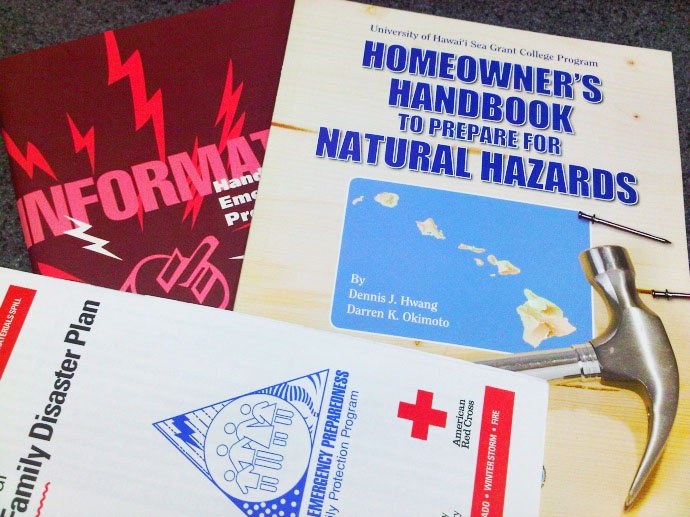Hurricane Preparedness Tips and Checklists

Emergency preparedness pamphlets are available from the Maui County Civil Defense Agency. Photo by Wendy Osher.
As Hurricane Lane continues on its path towards the islands, we are taking the opportunity to provide some helpful preparedness tips, provided by various businesses, organizations and government entities including Maui Electric, government leaders and the Red Cross.
Below is a compilation of information including a recommended Checklist for emergency kits, how to protect your home, and what kind of items would be helpful during power outages, flooding or high wind events.
The Hurricane season in Hawaiʻi runs from June 1 to November 30.
For the season as a whole, 3 to 6 tropical cyclones are predicted for the Central Pacific Hurricane basin, according to the Central Pacific Hurricane Season Outlook released earlier this year. This number represents a near- or above-normal season and includes tropical depressions, named storms and hurricanes. A near-normal season has 3-5 tropical cyclones, and an above-normal season has 6 or more tropical cyclones.
Recommended Emergency Checklist: (courtesy Maui Electric)
- 14-day supply of non-perishable foods (with little to no cooking required)
- Water (a minimum of 1-gallon per person per day for drinking and additional uses)
- Flashlights or lanterns (battery, hand crank or solar powered)
- Cell phone and charger
- Pet food and extra water for your pet
- Portable radio (battery, hand crank or solar powered)
- Extra batteries
- Manual can and bottle opener
- Butane/propane stove or charcoal grill with fuel
- Ice chest and ice or frozen ice packs
- Matches and/or lighter
- Mosquito repellant
- Cash or travelers checks
- Personal hygiene, sanitary supplies and diapers
- First aid kit and medicines
- Special needs supplies (eyeglasses, hearing aid, medical bracelet, etc)
*Maui Electric has also compiled an Emergency Preparedness Handbook which is available HERE.
Additional Items to Add if You Need to Evacuate:
- Important papers/photos
- One complete change of clothing and sturdy shoes
- Sleeping bag and/or blanket
Prepare Your Home:
- Tie down or store all loose objects including plants
- Unplug electric appliances you may not need or use
- Cover all windows and door openings with boards or shielding materials
- Properly secure propane tanks
- Secure elevators on the top floor of your condominium
**Below info: (Courtesy City and County of Honolulu from prior hurricane event).
Additional Home Preparedness Tips:
- Protect your property. Declutter drains and gutters. Consider hurricane shutters. Review insurance policies.
- Be prepared to bring loose, lightweight objects inside that could become projectiles in high winds (e.g., patio furniture, garbage cans); anchor objects that would be unsafe to bring inside (e.g., propane tanks); and trim or remove trees close enough to fall on the building.
- Be prepared to cover all of your home’s windows. Permanent storm shutters offer the best protection for windows. A second option is to board up windows with 5/8” exterior grade or marine plywood, cut to fit and ready to install.
Check insurance policies:
Remember that homeowners insurance alone will not cover hurricane damage. You will need separate policies for hurricane as well as flood insurance to protect against damage from coastal flooding. You can buy flood insurance separately through the National Flood Insurance Program. Make sure to check and know what your existing insurance policies will or will not cover.
Non-English Speakers and Disabled:
If you have a family member who does not speak English or a family member who, due to a disability cannot receive emergency information readily, it is highly recommend that they form a core group of family or friends who can assist with translations or providing important emergency information as well as assisting with disaster preparedness actions and if needed, evacuation.
Hurricanes and Tropical Storms:
Once a storm system crosses the 140-degree west longitude mark, it enters the Central Pacific area and would be in “Hawaiian” waters. Carefully monitor any hurricanes or tropical storms that develop or enter into Hawaiian waters until they safely pass our islands or dissipate.
First Aid Kit:
- Current prescription medications (ideally 14-day supply)
- Tissue/cotton swabs
- Antibacterial soap
- Bandages, plastic strip, assorted sizes
- Antiseptic solution
- Water purification materials
- Rubbing alcohol
- Aspirin (or aspirin-free tablets or capsules)
- Tweezers
The American Red Cross lists the following tips to prepare for a hurricane:
- Listen to a NOAA Weather Radio for critical information from the National Weather Service (NWS).
- Check your disaster supplies. Replace or restock as needed.
- Bring in anything that can be picked up by the wind (bicycles, lawn furniture).
- Close your windows, doors and hurricane shutters. If you do not have hurricane shutters, close and board up all windows and doors with plywood.
- Turn your refrigerator and freezer to the coldest setting. Keep them closed as much as possible so that food will last longer if the power goes out.
- Turn off propane tank.
- Unplug small appliances.
- Fill your car’s gas tank.
- Create a hurricane evacuation plan with members of your household. Planning and practicing your evacuation plan minimizes confusion and fear during the event.
- Find out about your community’s hurricane response plan. Plan routes to local shelters, register family members with special medical needs and make plans for your pets to be cared for.
- Obey evacuation orders. Avoid flooded roads and washed out bridges.










